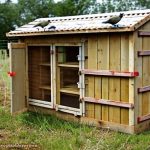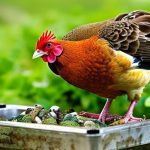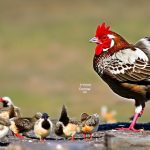Winterizing a chicken coop is crucial for maintaining the health and welfare of chickens during cold weather. Proper insulation is a key component of this process. Adding extra bedding materials like straw or wood shavings to the coop floor provides insulation.
Insulating the walls and ceiling with foam board or insulation blankets helps retain heat. Sealing drafts and gaps with weather stripping or caulk prevents cold air infiltration and warm air loss. Adequate ventilation is essential, despite the cold, to maintain air quality and prevent moisture accumulation.
Adjustable vents or windows can be installed to regulate airflow, striking a balance between warmth and proper air circulation. This helps prevent respiratory issues in chickens. Other important aspects of winterizing include providing nutritious, warm feed and fresh water.
Maintaining a clean, dry environment is also vital for the flock’s comfort and health during colder months. These measures collectively contribute to the well-being of chickens in winter conditions.
Table of Contents
Key Takeaways
- Winterizing the chicken coop is essential to protect the chickens from harsh weather conditions.
- Adequate insulation helps to maintain a comfortable temperature inside the coop during winter.
- Proper ventilation is crucial to prevent moisture buildup and maintain air quality inside the coop.
- Offering nutritious and warm feed helps to keep the chickens healthy and warm during winter.
- Providing fresh water is important to ensure the chickens stay hydrated, especially during cold weather.
- Maintaining a clean and dry environment helps to prevent the spread of diseases and keeps the chickens comfortable.
- Regularly monitoring the health and behavior of the chickens is important to address any issues promptly and ensure their well-being during winter.
Providing Adequate Insulation
Bedding Materials for Insulation
When it comes to providing adequate insulation for the chicken coop, one of the most common methods is to add extra layers of bedding to the floor of the coop. This can include materials such as straw, wood shavings, or even shredded paper. These materials not only provide insulation but also help to absorb moisture and provide a comfortable surface for the chickens to walk and roost on.
Insulating Walls and Ceiling
In addition to insulating the floor, it’s important to insulate the walls and ceiling of the coop as well. This can be done using foam board insulation, insulation blankets, or even recycled denim insulation. These materials can help to retain heat and keep the cold out, creating a more comfortable environment for the chickens.
Heat Lamps and Heated Pads
Another option for providing adequate insulation in the chicken coop is to use heat lamps or heated pads. These can be placed in strategic locations within the coop to provide additional warmth during particularly cold nights. However, it’s important to use caution when using heat lamps, as they can pose a fire hazard if not used properly. Additionally, it’s important to ensure that any electrical cords or heating elements are safely secured and out of reach of the chickens to prevent accidents.
Ensuring Proper Ventilation

Ensuring proper ventilation in the chicken coop is crucial for maintaining good air quality and preventing moisture buildup, especially during the winter months. One way to achieve proper ventilation is by installing adjustable vents or windows that can be opened and closed as needed to regulate airflow. This allows you to strike a balance between keeping the coop warm and dry while still allowing for adequate ventilation to prevent respiratory issues in the chickens.
It’s important to monitor the humidity levels in the coop and adjust the ventilation as needed to maintain a healthy environment for the chickens. In addition to adjustable vents or windows, you can also consider installing a ridge vent or gable vent to provide continuous airflow in the coop. These types of vents are designed to allow warm, moist air to escape from the top of the coop while preventing drafts from entering at ground level.
This helps to maintain good air circulation and prevent condensation from building up inside the coop. Another option for ensuring proper ventilation is to install a small exhaust fan in the coop. This can help to remove stale air and moisture from the coop, especially during periods of prolonged cold or wet weather.
Overall, ensuring proper ventilation in the chicken coop is essential for maintaining good air quality and preventing respiratory issues in the flock.
Offering Nutritious and Warm Feed
Offering nutritious and warm feed is essential for keeping your chickens healthy and comfortable during the winter months. One way to provide warm feed is by offering warm water or broth with their regular feed. This not only helps to keep them hydrated but also provides warmth from the inside out.
You can also consider offering warm oatmeal or cooked grains as a treat for your chickens on particularly cold days. These warm treats can help to provide extra energy and warmth for the chickens during colder weather. In addition to offering warm feed, it’s important to ensure that your chickens are receiving a balanced and nutritious diet year-round.
This includes providing a high-quality layer feed that is specifically formulated for laying hens, as well as offering supplemental treats such as fruits, vegetables, and mealworms. It’s important to monitor their food intake and adjust their diet as needed based on their activity level and environmental conditions. Providing nutritious and warm feed is essential for keeping your chickens healthy and comfortable during the winter months.
Providing Fresh Water
Providing fresh water is crucial for keeping your chickens healthy and hydrated during the winter months. One of the biggest challenges during winter is preventing water from freezing in cold temperatures. One way to ensure that your chickens have access to fresh water is by using heated waterers or adding a heated base to their existing waterers.
These devices are designed to prevent water from freezing, ensuring that your chickens have access to clean water at all times. It’s important to regularly check these devices and ensure that they are functioning properly to prevent dehydration in your flock. Another option for providing fresh water is by using insulated waterers or placing waterers in a sheltered area within the coop or run.
This can help to prevent water from freezing as quickly and provide your chickens with access to fresh water throughout the day. It’s important to monitor the water levels in the waterers and refill them as needed, especially during particularly cold or windy days when water may freeze more quickly. Overall, providing fresh water is essential for keeping your chickens healthy and hydrated during the winter months.
Maintaining a Clean and Dry Environment

Regular Cleaning and Bedding Replacement
One way to achieve this is by regularly cleaning out soiled bedding and replacing it with fresh bedding. This helps to prevent moisture buildup and ammonia odors, which can be harmful to the respiratory health of your chickens.
Preventing Mold Growth and Pest Infestations
Additionally, it’s important to regularly clean out any droppings or spilled feed from the coop floor to prevent mold growth and pest infestations.
Ensuring Proper Ventilation and Humidity Control
In addition to regular cleaning, it’s important to ensure that the coop is well-ventilated and free from drafts that can contribute to moisture buildup. This can be achieved by sealing any gaps or cracks in the walls, windows, doors, and roof of the coop with weather stripping or caulking. It’s also important to monitor the humidity levels in the coop and adjust ventilation as needed to maintain a dry environment for your chickens.
Monitoring the Health and Behavior of the Chickens
Monitoring the health and behavior of your chickens is crucial for identifying any potential issues early on and providing prompt care when needed. During the winter months, it’s important to pay close attention to any signs of illness or distress in your flock, as they may be more susceptible to health issues during colder weather. This includes monitoring their appetite, activity level, droppings, and overall appearance on a daily basis.
In addition to monitoring their physical health, it’s also important to observe their behavior and interactions within the flock. This can help you identify any signs of stress, aggression, or bullying that may arise due to changes in their environment or routine during winter. It’s important to provide enrichment activities such as hanging treats or providing perches and roosts to keep them active and engaged during colder weather.
Overall, monitoring the health and behavior of your chickens is essential for ensuring their well-being during the winter months. By staying vigilant and proactive in caring for your flock, you can help them stay healthy and comfortable throughout the colder months.
If you’re looking for tips on how to keep chickens in the winter, you may also be interested in learning about the best chicken coop and run plans. Check out this article for helpful information on creating a comfortable and secure space for your feathered friends.
FAQs
What are the key considerations for keeping chickens in the winter?
In order to keep chickens healthy and comfortable during the winter, it’s important to consider their housing, diet, water supply, and protection from the cold.
How should chicken coops be prepared for winter?
Chicken coops should be insulated and draft-free to protect the chickens from the cold. Adding extra bedding, such as straw or wood shavings, can also help keep the coop warm.
What should chickens eat in the winter?
Chickens require a balanced diet in the winter, including a mix of grains, protein, and fresh greens. It’s important to provide them with enough food to maintain their body heat during the colder months.
How can water be kept from freezing in the winter?
To prevent water from freezing, use heated waterers or check water sources frequently to ensure they don’t freeze. Adding a small amount of apple cider vinegar to the water can also help prevent freezing.
How can chickens be protected from predators in the winter?
During the winter, predators may be more desperate for food and more likely to target chickens. Ensure that the coop is secure and consider adding extra locks or reinforcements to keep predators out.
Meet Walter, the feathered-friend fanatic of Florida! Nestled in the sunshine state, Walter struts through life with his feathered companions, clucking his way to happiness. With a coop that’s fancier than a five-star hotel, he’s the Don Juan of the chicken world. When he’s not teaching his hens to do the cha-cha, you’ll find him in a heated debate with his prized rooster, Sir Clucks-a-Lot. Walter’s poultry passion is no yolk; he’s the sunny-side-up guy you never knew you needed in your flock of friends!







